Websites about inspiring language learning
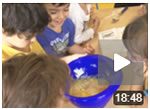 MuLiPEC, a project of the University of Luxembourg, addresses the need for multilingual pedagogies in early childhood education in Luxembourg. It aims to develop teachers’ and educators’ knowledge and skills in relation to multilingualism and effective pedagogies and to contribute to the development of young children's multiple languages in educational settings.
MuLiPEC, a project of the University of Luxembourg, addresses the need for multilingual pedagogies in early childhood education in Luxembourg. It aims to develop teachers’ and educators’ knowledge and skills in relation to multilingualism and effective pedagogies and to contribute to the development of young children's multiple languages in educational settings.
On the MuLiPEC website, you can find:
- a series of videos, illustrating inspiring multilingual/plurilingual practices of teachers, educators and children using several languages in daily routines and planned activities in preschools and day-care centres. Some of the videos have French or English subtitles;
- the project’s newsletter in German and the magazine DIALOG in a multilingual and a French version, presenting language learning concepts and language learning activities with young children;
- links to articles and book chapters.
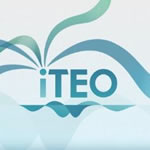 iTEO project, examining the use of the App iTEO for teaching and learning languages in preschools and primary schools, is funded by the University of Luxembourg and the Ministry of Education, Childhood and Youth. It addresses the need for innovative teaching approaches which support teachers and educators in managing linguistic and cultural diversity in preschools and schools in Luxembourg.
iTEO project, examining the use of the App iTEO for teaching and learning languages in preschools and primary schools, is funded by the University of Luxembourg and the Ministry of Education, Childhood and Youth. It addresses the need for innovative teaching approaches which support teachers and educators in managing linguistic and cultural diversity in preschools and schools in Luxembourg.
The iTEO App, which records and edits language, supports holistic, active and meaningful language learning practices and offers children opportunities to draw on their linguistic repertoire. The project findings show that children used and developed several languages while narrating stories in collaboration with peers on iTEO.
On the iTEO website, you can find:
- a series of videos and short clips showing the use of the app at preschool and primary school level with short explanations in English;
- links to scientific publications;
- the Echo iTEO magazine written for professionals.
The App is available in the Appstore (iTeo2).
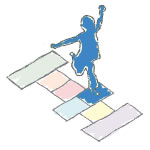 (Language day-care centres: Because language is a key to the world)
(Language day-care centres: Because language is a key to the world)
Sprach-Kitas is a federal programme developed by the German Federal Ministry for Family Affairs, Senior Citizens, Women and Youth. It promotes language education which is integrated into the everyday life of young children in day-care centres – serving as an important step towards more equal opportunities.
On the website, you can find:
- a toolbox which provides professionals with a lot of practical tools;
- posters showing examples of inspiring language learning in a clear and attractive way:
- a video showing language learning activities in German day-care centres: Haben Ameisen Ohren? (Do ants have ears?)
- A short animation film in different languages (Arabic, English, French, Russian, Turkish) showing how collaboration with parents can be successful
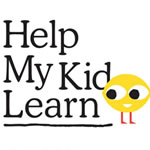 This website, designed by NALA (The Irish National Adult Literacy Agency), as part of the national strategy ‘Literacy and Numeracy for Learning and Life’ (Department of Education and Skills 2011), provides general information, playful and fun activities as well as useful tips to support children in developing their literacy and numeracy skills on an everyday basis.
This website, designed by NALA (The Irish National Adult Literacy Agency), as part of the national strategy ‘Literacy and Numeracy for Learning and Life’ (Department of Education and Skills 2011), provides general information, playful and fun activities as well as useful tips to support children in developing their literacy and numeracy skills on an everyday basis.
Designed primarily for parents, the website, with its activities covering different age groups (0 to 12 years), is also interesting for professionals working with children at different levels.
 (Keys for the future of young people in the Greater Region)
(Keys for the future of young people in the Greater Region)
SESAM’ GR aims at preparing young people from an early age to live, develop and work in an attractive and competitive cross-border region, the Greater Region (Lorraine, Rhineland-Palatinate, Luxembourg, Saarland, Belgium). The project is funded through the Interreg V programme and focuses on projects, initiatives and tools in three main areas: supporting and strengthening multilingual pathways from kindergarten to secondary school, developing young people's intercultural skills with a view to promoting shared citizenship and, finally, preparing future employees for the professional prospects of the Greater Region.
The resource portal (portail de ressources) is a treasure trove of materials, experiences shared by teachers and educators coming from different contexts.
 Amy Klipp’s blog, a self-confessed “veteran of the ESL classroom”, offers a treasure trove of practical ideas, tools and materials that make language learning inspiring. She addresses various issues that professionals who teach English as a second language may face: the use of L1 or L2 in the class, managing diverse classrooms, developing a programme of study, assessing learning and progress of children and stimulating learning through the use of multiple intelligences.
Amy Klipp’s blog, a self-confessed “veteran of the ESL classroom”, offers a treasure trove of practical ideas, tools and materials that make language learning inspiring. She addresses various issues that professionals who teach English as a second language may face: the use of L1 or L2 in the class, managing diverse classrooms, developing a programme of study, assessing learning and progress of children and stimulating learning through the use of multiple intelligences.
*ESL: English-As-A-Second-Language-teacher
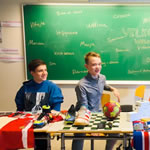 K.R. Vilhjálmsdóttir created the flying carpet in Denmark and then brought it to Iceland where she further developed it as part of her job at the Reykjavík City Library. The flying carpet gives children the possibility to show what they are good at, what they care most about, what makes them unique and exceptional; it creates intercultural and multilingual spaces where they can meet – together with their parents, teachers and educators.
K.R. Vilhjálmsdóttir created the flying carpet in Denmark and then brought it to Iceland where she further developed it as part of her job at the Reykjavík City Library. The flying carpet gives children the possibility to show what they are good at, what they care most about, what makes them unique and exceptional; it creates intercultural and multilingual spaces where they can meet – together with their parents, teachers and educators.
“At the cultural encounters the students communicate their personal culture, their interests and the things that matter most to them and therefore also languages. (…) The project fits all kinds of teaching. Also language teaching, because when you learn a new language it’s of great benefit for the learning process to connect to your own life and your personal world of experience. In that way you can link to the new language in a secure way. When an individual gets to flourish it is more likely that a society or the group flourishes as well.”
Let yourself be inspired by looking at the videos on the website.
If you want to find out more about the project and ways of implementing it in your own context, don’t hesitate to contact Mrs Vilhjálmsdóttir (kristinvil@gmail.com).
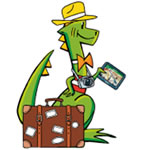 (With Europe through Europe – an educational game in Polish)
(With Europe through Europe – an educational game in Polish)
Europek, a cheerful dragon, takes children on an adventurous trip across Europe. Together they discover interesting places, food, traditions and customs. Players can test and expand their knowledge of geography, history and culture of various European countries as well as expressions in different languages.
The concept of the game follows the European Language Portfolio (ELP) assumptions. The ELP works as a self-assessment tool which helps to document the learning pathways for learning foreign languages and discovering other cultures. The ELP as well as the game aim to motivate children and young people to acquire and develop new language and intercultural skills by promoting multilingualism and demonstrating its use in everyday life.
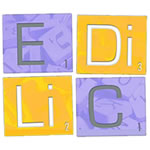 Language awareness/Awakening to languages is at the heart of EDiLIC’s website which invites all users, young and old, monolingual or plurilingual, to discover the vast diversity of languages round the world. A large number of texts and documents are available in both French and English. You will find here many inspiring resources (publications, videos, pedagogical resources, tools, websites, etc.) as well as information about Language Awareness and the international association EDiLIC itself. They all have one thing in common: to awaken your and your children’s curiosity about the languages that surround you and make you aware that you are much more plurilingual than you think you are.
Language awareness/Awakening to languages is at the heart of EDiLIC’s website which invites all users, young and old, monolingual or plurilingual, to discover the vast diversity of languages round the world. A large number of texts and documents are available in both French and English. You will find here many inspiring resources (publications, videos, pedagogical resources, tools, websites, etc.) as well as information about Language Awareness and the international association EDiLIC itself. They all have one thing in common: to awaken your and your children’s curiosity about the languages that surround you and make you aware that you are much more plurilingual than you think you are.
 The project "Residence Reebou - my multilingual village" aims to make both children and teachers/educators aware of the linguistic richness of Luxembourgish society and, moreover, of the potential benefits of plurilingualism.
The project "Residence Reebou - my multilingual village" aims to make both children and teachers/educators aware of the linguistic richness of Luxembourgish society and, moreover, of the potential benefits of plurilingualism.
Based on the “Awakening to Languages” (Language Awareness) approach, the project supports children in reflecting their linguistic identity and the languages present in their environment; gaining a better understanding of the linguistic context they live in, awakening their curiosity about languages. They explore their linguistic environment; through language portraits, interviews and observations they discover the languages of their immediate environment and think about the role of different languages in society.
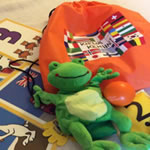 Early Language Learning in the Finnish city of Tampere aims to promote equal language learning opportunities for all children in early childhood and basic education; encourage young children to get in touch with different languages and cultures; develop positive and open attitudes towards the learning of (new) languages; enable them to make open-minded language choices later on in their schooling and professional careers. The project reflects the National Curriculum for Pre-primary and Primary Education and recent policy developments (see article in the section “Links and further reading”).
Early Language Learning in the Finnish city of Tampere aims to promote equal language learning opportunities for all children in early childhood and basic education; encourage young children to get in touch with different languages and cultures; develop positive and open attitudes towards the learning of (new) languages; enable them to make open-minded language choices later on in their schooling and professional careers. The project reflects the National Curriculum for Pre-primary and Primary Education and recent policy developments (see article in the section “Links and further reading”).
The blog Kieliä kehiin! Tampereen kaupungin kielirikasteisen hankkeen blogi offers many concrete ideas and tools that support a playful approach towards languages. Most of them are presented in Finnish – which will allows you to test out your own plurilingual competences! Some resources are multilingual or presented in English, for example
- a list with songs in different languages and a set of multilingual cards with numbers and animals (e.g., English, French, German, Spanish);
- a list presenting playful activities (in English) that supports young children in making contacts with new languages.
 Storyline is a learning and teaching approach in which the teacher designs the ‘line’ – the chapters of a story – and the learners create and develop the story. The line or plan aims at curricular content (knowledge) and skills practice while the story provides the context within which children develop motivation through ownership. They create the characters that will bring the story to life. The ‘line’ is designed through a series of key questions.
Storyline is a learning and teaching approach in which the teacher designs the ‘line’ – the chapters of a story – and the learners create and develop the story. The line or plan aims at curricular content (knowledge) and skills practice while the story provides the context within which children develop motivation through ownership. They create the characters that will bring the story to life. The ‘line’ is designed through a series of key questions.
Storyline allows young learners to use the language(s) of schooling (including foreign languages) to construct/co-construct meaning and to communicate with others while planning, reflecting, arguing, negotiating, explaining and linking thoughts, ideas and findings, etc. Children become actively involved as they develop a story, bringing existing skills and knowledge to bear. When looking for relevant information needed to develop a story, they access subject-specific knowledge, skills and competences. As it relates language learning to subject learning, the storyline approach can be used in the learning and teaching of all subjects.
The storyline approach was first developed in Glasgow, Scotland but over the years, it has spread to teachers, educators, children, adolescents and parents all over the world.
On the website, you will find inspiring projects, topics and ideas from different countries ranging from Alaska to Uganda.
 Dulala, an association founded in 2009, focuses on the existing linguistic potential of children and young people as a resource for learning new languages and as an opportunity for all actors to improve their lives and learning together. In France Dulala is regarded as a national reference point in the field of multilingualism. The association develops innovative tools, which are tested in workshops with children and disseminated during training courses. Based on scientific research that has demonstrated the positive effects of taking into account children's family languages for subsequent learning, Dulala supports professionals in the education sector in setting up activities that reflect the growing linguistic and cultural diversity.
Dulala, an association founded in 2009, focuses on the existing linguistic potential of children and young people as a resource for learning new languages and as an opportunity for all actors to improve their lives and learning together. In France Dulala is regarded as a national reference point in the field of multilingualism. The association develops innovative tools, which are tested in workshops with children and disseminated during training courses. Based on scientific research that has demonstrated the positive effects of taking into account children's family languages for subsequent learning, Dulala supports professionals in the education sector in setting up activities that reflect the growing linguistic and cultural diversity.
The site offers multilingual educational resources, an overview of its training activties (on-site, online) and information for parents. Dulala truly celebrates the multilingualism of diverse institutions and the multilingualism of its actors!